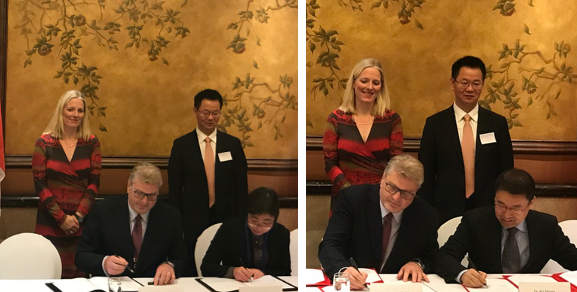Beijing, CHINA – By working together, Canada and China are another step closer to cutting industrial greenhouse gas (GHG) emissions and meeting Paris Agreement targets for mitigating climate change. Today, the technology and innovation research institutes of Sinopec and China Huaneng Group - have signed Memorandum of Understandings (MOUs) with the International CCS Knowledge Centre, based in Regina Saskatchewan, Canada.
The MOUs signal a path forward for the two countries to collaborate in the development, demonstration and deployment of Carbon Capture Utilization and Storage (CCUS) thereby reducing GHG emissions and providing energy security.
CCUS is recognized as a clean technology with the ability to make the single largest impact to GHG emission reductions. It is a necessary complement in the efforts to maximize renewable energies for a diverse, low carbon and reliable energy portfolio. The Honourable Catherine McKenna, Minister of Environment and Climate Change Canada was on hand to witness the signing.
Canada is a global leader and pioneer in CCUS. CCUS expertise is facilitated with the world through the International CCS Knowledge Centre who is mandated to support climate action by sharing the experience acquired from the construction through operation and maintenance of SaskPower's Boundary Dam 3 Carbon Capture Facility - the world’s first commercial scale CCUS facility on a coal fired power plant.
The International CCS Knowledge Centre will work directly with Sinopec Nanjing Research Institute of Chemical Industry (Sinopec) as well as with Huaneng Clean Energy Research Institute (CERI) to produce tangible CCUS deliverables. To do this work the parties will collaborate on research efforts; optimize technology (for both coal-based emission products as well as other industrial combustion sources); improve performance of solvent-based emission capture processes; and bring together other international expertise to further advance CCUS.
Quotes
“Collaboration with China – means we are advancing CCUS by joining forces of know-how, to improve technology, reduce cost and risk and actively work together on a solution to tackle climate change.”
- Mike Monea, President & CEO, International CCS Knowledge Centre
"The agreements signed today will enable the use of Canadian expertise and knowledge to advance Carbon Capture, Utilization and Storage applications in China. This is just one of the many examples of Canadian institutions and companies working around the world to reduce carbon pollution and deliver clean solutions."
- Catherine McKenna, Minister of Environment and Climate Change Canada
Quick Facts
China
- China accounts for 25% of the world’s GHG emissions.
- Currently China has 960 Gigawatts of coal-fired capacity which accounts for 45% of the world coal-capacity. By 2020, China will have 1100 Gigawatts.
Canadian Expertise
- Examples of large scale Canadian expertise in CCUS: SaskPower’s BD3 CCUS Facility; Weyburn-Midale CO2 Monitoring and Storage Project; Aquistore CO2 Storage Project; and the Shell Quest CCS Facility.
- The work facilitated by the International CCS Knowledge Centre supports Article 6 of the Paris Agreement which outlines an opportunity for countries to receive Internationally Transferred Mitigation Outcome (ITMOs) towards nationally determined contributions. (Canada’s response to ITMOs, click here.)
CCUS with Renewables
- CCUS, like renewable energy sources, such as wind, solar, hydro is a tool for energy reliability while reducing GHG emissions - they are complimentary and can co-exist.
- CCUS has a role as a clean technology - without large-scale deployment of CCUS, realizing a low emission pathway is unlikely and more expensive.
- CCUS will help the transition to a low-carbon sustainable future by phasing out unabated/ conventional fossil fuel emissions.
International CCS Knowledge Centre
- Currently the International CCS Knowledge Centre has two additional MOUs with agencies in China, with the Research Institute of Shaanxi Yanchang Petroleum (Group) Corp. Ltd.; as well as the China National CCUS Centre in Shaanxi (click here for further details).
- The International CCS Knowledge Centre is host to the Carbon Capture, Utilization and Storage Technology Cluster at the renowned Globe Series – Sustainability & Business Forum in Vancouver in March 2018.
Links
Climate Change
- Global CCS Institute: The Climate Change Challenge
- IPIECA: CCS as a Key for Low Emissions – Paris Puzzle
CCS Links
- International Energy Agency, GHG: What is CCS?
- Global CCS Institute: CCS Readiness Index
#CCSKnowledge
#CleanTech
#CCUS
t: @CCSKnowledge
w: CCSKnowledge.com
Contact
Jodi Woollam
Head of Communications & Media Relations
jwoollam@ccsknowledge.com
T: +1-306-565-5956 / M: +1-306-520-3710 / F: +1-306-565-5668
About the International CCS Knowledge Centre: Operating under the direction of an independent board, the International CCS Knowledge Centre was established by BHP and SaskPower in 2016 with a mandate to advance the understanding and use of CCUS globally to reduce greenhouse gas emissions. The International CCS Knowledge Centre does this by allowing the learnings acquired at the Boundary Dam Carbon Capture Facility to be shared broadly, and to ensure further CCS research to be conducted.
About the Sinopec Nanjing Research Institute of Chemical Industry (Sinopec): Sinopec has worked on flue gas capture since 1980s with a research objective to optimize the amine performance, a primary challenge for CCUS technology. Now working on new generation of amine for flue gas under the designation as Key Laboratory for CO2 Capture and Utilization of Sinopec (owning the largest down-stream chemical assets in China), the Gas Purification Division of the Institute, is undertaking the R&D in optimization of post-combustion solvent performance under a comprehensive national CCUS programme sponsored by the Ministry of Science and Technology.
About Huaneng Clean Energy Research Institute (CERI): CERI is a leader in clean energy research & development with the coal intensive power sector, directly under China Huaneng Group (CHNG), the largest power company in Asia and China. Designated as the National Key Lab for Coal-based Clean Energy, CERI has developed post-combustion CCS expertise through piloting platforms, while undertaking pre-combustion CCS system development with China’s first proprietary IGCC power plant (GreenGen) under the comprehensive national CCUS programme sponsored by the Ministry of Science and Technology.
International CCS Knowledge Centre
306.565.KNOW(5669)
198 - 10 Research Drive Regina, SK S4S 7J7 Canada

 News
News